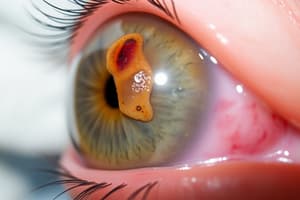Podcast
Questions and Answers
Cycloplegic drugs are used for specific treatment of corneal ulcers.
Cycloplegic drugs are used for specific treatment of corneal ulcers.
False (B)
Mechanical debridement is a treatment option for non-healing ulcers.
Mechanical debridement is a treatment option for non-healing ulcers.
True (A)
Graft rejection is an early complication of treatment for corneal ulcers.
Graft rejection is an early complication of treatment for corneal ulcers.
False (B)
Lamellar Keratoplasty is a type of treatment for non-healing ulcers.
Lamellar Keratoplasty is a type of treatment for non-healing ulcers.
Neurotrophic Keratopathy is a type of congenital anomaly.
Neurotrophic Keratopathy is a type of congenital anomaly.
Acute hydrops is a complication of keratoconus.
Acute hydrops is a complication of keratoconus.
Flashcards are hidden until you start studying
Study Notes
Corneal Ulcers
- Specific treatment of corneal ulcers involves topical antibiotics like fortified Cefazoline, tobramycin, and vancomycin, as well as systemic antibiotics.
Non-Healing Ulcers
- Mechanical debridement, cauterization, and paracentesis are used to treat non-healing ulcers.
Impending Perforation
- Treatment for impending perforation involves addressing corneal opacity and therapeutic interventions.
Resistant Ulcers
- Penetrating and Lamellar Keratoplasty are types of resistant ulcers.
Complications of Treatment
- Early complications of treatment include infection, while late complications include graft rejection.
Keratitis Types
- Dendritic, Trophic, Herpetic, and Disciform keratitis are different types of keratitis, each requiring unique diagnosis and treatment.
Corneal Anatomy and Physiology
- The cornea has specific functions, blood supply, and nerve supply that are essential for its normal functioning.
Congenital Anomalies and Inflammation
- Megalocornea is a congenital anomaly, and keratitis can be classified into different types, including bacterial corneal ulcers.
Neurotrophic Keratopathy
- Causes of neurotrophic keratopathy include impaired corneal sensation, and symptoms and signs include corneal ulceration, perforation, and vision loss, while treatment options involve addressing underlying causes and supportive care.
Keratoconus
- Diagnostic tools for keratoconus include various methods, and potential complications include acute hydrops.
Studying That Suits You
Use AI to generate personalized quizzes and flashcards to suit your learning preferences.




